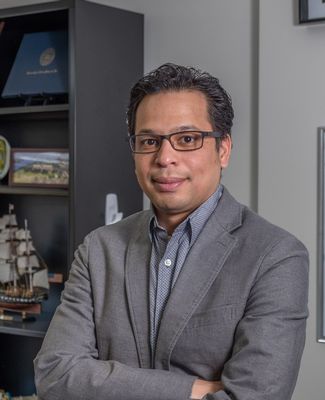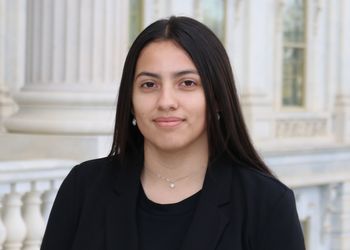JMC's Human Rights Lab is Truly One of a Kind

JMC's Human Rights Lab is Truly One of a Kind
December 9, 2020About four years ago, on a tour of Spartan Stadium, MSU Professor Robert Brathwaite had an idea.
Brathwaite, an associate professor of international relations at James Madison College, had invited a friend who worked at the International Criminal Court (ICC) to give a talk at MSU. Knowing his friend was a Spartan football fan, Brathwaite arranged a tour of the stadium before the event.
On the tour, Brathwaite was struck by a startling fact. His friend informed him that the entire investigative budget of the ICC is a small fraction of the athletic budget at Michigan State. “This led to the realization there is a vast untapped potential at MSU,” said Brathwaite. Recognizing the need to address a serious resource disparity associated with human rights and international investigations, while providing a unique learning opportunity for his students, Brathwaite established the Human Rights Lab.
An experiential learning project, the Human Rights Lab provides opportunities for students to engage in policy-relevant research associated with the investigation of human rights violations, and the development of specific career-related skills. Using technology such as satellite imagery, geographic information system (GIS), and automatic identification system (AIS) ship transponder data, the lab helps international legal organizations, like the ICC, investigate crimes against humanity and other crimes of international concern.
Support the work of the Human Rights Lab today!
While stationed in East Lansing, the lab’s work is already making a global impact. Using thermal imaging technology, the lab created a map detailing the systematic burning of Rohingya Muslim villages in Myanmar. The lab has also used satellite image analysis to map the command structure of militia groups in Venezuela. In both cases, the lab’s work has led to two Article 15 Submissions to the International Criminal Court for human rights violations in these countries.
The Swiss human rights organization TRIAL International recently used the lab’s analysis of satellite imagery and AIS transponder data in a case against a corporate entity suspected of engaging in illicit smuggling activities in Libya. Katelyn Bishop, an international relations and public policy senior from Brighton, Michigan, was one of the lab students involved in developing the evidence used in the TRIAL International case.
“From this work, we were able to provide Trial with information that ultimately helped them bring a case against the corporation engaging in this shipping activity. It was a full circle moment in which I was truly able to see the impact we have as a lab.”
Katelyn Bishop, Student Lab Leader
In four years, the lab has grown from a small group of six to almost twenty students. According to Brathwaite, the Human Rights Lab at MSU is one of the only groups of its kind operating at the undergraduate level. Programs at other universities that focus on human rights issues tend to be associated with graduate programs, with a heavy concentration in law schools.
These organizations tend to focus their efforts on generating legal briefs and advocacy work. In contrast, the lab focuses on producing actionable information along with providing technical support capacities to directly aid ongoing investigations. It also provides career-development opportunities for undergraduate students in a wide range of fields including law, international development, national security, and foreign policy. This focus makes the lab’s work truly unique while supporting the important work of international partners involved in the protection of human rights and international law.
The lab has sent students to intern at the International Criminal Court and has cooperated on research projects with the United Nations and other civil society actors. Offering this type of experience to undergraduates is important because it offers an “early opportunity for students to develop academic interests and professional skill sets that they can utilize to pursue different academic and professional opportunities post-graduation,” said Brathwaite.
Prior to joining the lab, Student Lab Leader Emma Frick, an international relations and social relations and policy senior from Saline, Michigan, said she struggled deciding what she intended to do after graduation. “The lab has helped hone my research and analysis skills,” said Frick. “The skills I’ve gained, such as satellite imagery analysis, social media analysis, and open source data mining, will set me apart from others and open many doors in the areas like research and policy or report writing.”
Alicia Boos, an international relations and comparative cultures and politics senior from Macomb, Michigan, said that her involvement with the Human Rights Lab has enriched her experience at MSU by allowing her to develop real world skills in a collaborative environment. “Being a Student Lab Leader in the JMC Human Rights Lab has been one of the most valuable experiences I have had here at Michigan State University,” said Boos. “The lab allows undergraduates to make a real impact within the international community and be part of something that is greater than ourselves.”
To continue to expand and be a “force multiplier” for the partner organizations it assists, Brathwaite said that the lab requires additional resources to access the technical tools they need to do their work. Most of the funds the Lab uses to operate have come from various competitive grants and contributions from Brathwaite and the student members themselves. “We have been doing a lot on a shoestring budget,” said Brathwaite.
“With increased support, the lab can expand to not only enhance our operations and provide more opportunities for students, but also to create a truly unique education program that enhances MSU’s reputation as a world-class educational institution where Spartans have a global impact.”
Dr. Robert Brathwaite, Associate Professor of International Relations
Additional private support will help the lab acquire satellite images and data sources. It will also help open up enhanced career and professional opportunities for the students involved. According to Brathwaite, the lab often has to divide its resources between conducting its work and providing meaningful professional development opportunities for students.
You can help expand and enhance the work of the Human Rights Lab by supporting their ongoing CrowdPower fundraising campaign today. Your gift provides resources needed to purchase satellite imagery, ship transponder data and other training resources for students in the group. Support the Human Rights Lab today!




